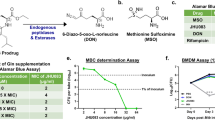Abstract
Mycobacterium avium is an opportunistic pathogen that may cause either localized or, in persons with acquired immune deficiency syndrome (AIDS), disseminated disease. Under certain conditionsM. avium exhibits a requirement for fatty acid for maximum production of colony-forming units (CFU). However, cerulenin, a drug that inhibits fatty acid synthetase, inhibited the growth ofM. avium LM1 (serovar 1) with a minimal inhibitory concentration of 10 μg/ml regardless of oleic acid supplementation at 50 μg/ml. Cerulenin at 10 μg/ml also inhibited the growth of five other strains ofM. avium isolated from AIDS patients. Octanoate, oleate, and palmitate, individually or in two-way combinations, were tested for ability to reverse the effect of cerulenin. Octanoate at 50 μg/ml could reverse the bactericidal effect of cerulenin at 10 μg/ml and the bacteriostatic effect of the drug at 5 μg/ml. Because cerulenin when effectively inhibiting production of CFU also prevented cell elongation, the data suggest that octanoate, or a metabolic product, is critical to cell division ofM. avium.
Similar content being viewed by others
Literature Cited
Aubert E (1950) “Cold” stain for acid-fast bacteria. Can J Public Health 41:31–32
Bloch K (1975) Fatty acid synthases fromMycobacterium phlei. Methods Enzymol 35:84–90
Brindley DN, Matsumura S, Bloch K (1969)Mycobacterium phlei fatty acid synthetase—a bacterial multienzyme complex. Nature 224:666–669
Fulco AJ (1983) Fatty acid metabolism in bacteria. Prog Lipid Res 22:133–160
Goldberg I, Walker JR, Bloch K (1973) Inhibition of lipid synthesis inEscherichia coli. Antimicrob Agents Chemother 3:549–554
Good RC (1985) Opportunistic pathogens in the genusMycobacterium. Annu Rev Microbiol 39:347–369
Mahajan S, Khjuller GH (1984) Cerulenin effect on phospholipid metabolism inMycobacterium smegmatis ATCC 607. Biochim Biophys Acta 795:493–498
Mantsala P (1982) Inhibition of protein secretion by cerulenin inBacillus subtilis. J Gen Microbiol 128:2967–2972
McCarthy C (1987) Utilization of nitrate or nitrite as single nitrogen source byMycobacterium avium. J Clin Microbiol 25:263–267
McCarthy C, Ashbaugh P (1981) Factors that affect the cell cycle ofMycobacterium avium. Rev Infect Dis 3:914–925
Omura S (1976) The antibiotic cerulenin, a novel tool for biochemistry as an inhibitor of fatty acid synthesis. Bacteriol Rev 40:681–697
Omura S (1981) Cerulenin. Methods Enzymol 72:520–532
Rogers HJ, Thurman PF (1985) The effect of cerulenin on the morphogenesis and autolytic activity ofBacillus subtilis. J Gen Microbiol 131:591–599
Vance D, Goldberg I, Mitsuhashi O, Block K, Omura S, Nomura S (1972) Inhibition of fatty acid synthetases by the antibiotic cerulenin. Biochem Biophys Res Commun 48:649–656
Wille W, Eisenstadt E, Willecke K (1975) Inhibition of de novo fatty acid synthesis by the antibiotic cerulenin inBacillus subtilis: effects on citrate-Mg2+ transport and synthesis of macromolecules. Antimicrob Agents Chemother 8:231–237
Wolinsky E (1979) Nontuberculous mycobacteria and associated diseases. Am Rev Respir Dis 119:107–159
Author information
Authors and Affiliations
Rights and permissions
About this article
Cite this article
McCarthy, C.M. Reversal of cerulenin inhibition ofMycobacterium avium by octanoate. Current Microbiology 17, 121–125 (1988). https://doi.org/10.1007/BF01573466
Issue Date:
DOI: https://doi.org/10.1007/BF01573466




